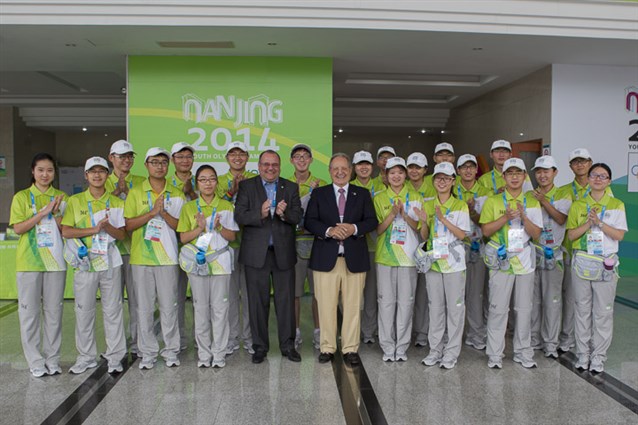It is hardly possible to remember anything from the Youth Olympic Games (YOG) in Nanjing without picturing at least one of the volunteers–named “Little limes” because of their green kit–who were “seemingly everywhere” as they followed the rhythm of the competition in airports and hotels, venues and buses. There were 20,000 of them, but just because the positions to cover were only 400; the number of applications had indeed been over five times that of the recruits. A staggering 103,000 people, mostly locals, had answered the call to build a new bridge that would connect their city to the rest of the world.
Wang Lu, 30, is an assistant at the Learn & Share Tent in the Youth Olympic Village (YOV); she has always lived in Nanjing. She thinks that her young fellow-citizens who have volunteered at the YOG will become global citizens as a result of their experiences. “These kids will know more about the world,” she said. “It's our first time to host such a worldwide event here. They'll have a broader look. We all wanted to take part in these Games and do whatever we could to help. I liked the spirit of sharing. I think it's very important, especially for the youth.”
Xue Ting, 21, helps visitors at the Green Space, an area of the YOV which advocates environmental protection. She's glad about getting to meet people and practice her French and English, which she has been studying at Nanjing Normal University for two years now. “You can make a lot of friends here,” she said. “You can communicate with them. I think it's very meaningful. We learn languages, and languages need practice.”
Though she has mainly spoken English in her work, she also wants to improve her French and has travel plans for that. “After I graduate, maybe I will go to France,” she said.
Lu Jo, 21, gives information at a booth in the main square of the YOV. Originally from Nantong city, Jiangsu province, she has been studying English for two years in Nanjing. She enjoys sharing her country's culture with foreign athletes. “It is a good chance,” she said, “to let the people in the world know more about our people.”
Chinese knots, made with red cord, are her favorite piece of Chinese culture. “They're very nice,” she said. “Red is the lucky color of China. We can show how to make them and why we like them: they create a happy atmosphere, they spread happiness. Then we can ask foreigners what's the happy symbol of their countries, and we can communicate with each other.”
Fan Li, 20, also takes care of the General Information booth at the YOV, like her friend Lu Jo. She was born in Taizhou, Jiangsu province, but she has been living in Nanjing for one year, where she's studying to teach Chinese to foreigners. “Sometimes athletes come here and we can teach them some simple Chinese words,” she said, “like 'Hǎo ba' [OK], 'Xièxiè' [Thank you] and 'Nín hǎo' [Hello]. It's exciting for me as a volunteer to be part of these exciting Games. It's a very great chance. We don't have that many chances to meet different kinds of people, and we hope this chance can improve ourselves. We can learn a lot.”
To her, communicating with foreigners means telling the story of her home country. “We can tell them about some interesting parts of China,” she said. “We hope more foreigners can know more about us.”
Dai Li, 16, is one of nine students who set up a booth on São Tomé e Príncipe in the World Culture area of the YOV. She got to practice her English as she introduced the culture of the second-smallest African country to foreign athletes; but English was not enough, as someone happened to only speak other languages. Still, that was not a problem. “If we don't have similar languages, we just play games. Chinese people can connect with others. To connect is very easy and good. Like a puzzle.”
She finally said that volunteering at the YOG “was a chance. Chinese people never want to lose chances.”

